A) STUDIO SESSIONS
Session #7 New York, 30/January/1936, Teddy Wilson & his Orchestra (CD: Complete in Columbia vol.1, tk17)
Gordon ‘Chris’ Griffin (tp) Rudy Powell (cl) Teddy Mc Rae (ts) Teddy Wilson (p) John Truehart (g) Grachan Moncur (b) Cozy Cole (d) Billie Holiday (v)
(MT 17) Life Begins When You’re In Love **
The image below is from the original 78rpm disk. Click here to listen.
Session #8 New York, 30/June/1936, Teddy Wilson & his Orchestra (CD: Complete in Columbia vol.1, tk18-21)
Jonah Jones (tp) Johnny Hodges (as) Harry Carney (bs) Teddy Wilson (p) Lawrence Lucie (g) John Kirby (b) Cozy Cole (d) Billie Holiday (v)
(MT 18) It’s Like Reaching For The Moon ** this is an emotional rendering of Billie of a less known song. Wilson opens and Hodges assumes, preparing Billie’s entry. Jonah Jones assumes the melodic line e closes the track.
The image below is from the original 78rpm disk. Click here to listen.
(MT 19) These Foolish Things *** song of great success, recently composed by Jack Strachey, lyrics from Holt Marvell. One of my favorites. (A tinkling piano in the next apartment…). Notice the opening Wilson solo, introducing the theme, alternating with Carney.
The image below is from the original 78rpm disk. Click here to listen.
(MT 20) I Cried For You * this record was Billie’s sales champion in Brunswick. That’s the first “standard” she recorded, a song from 1923 by Arthur Freed & Gus Arnheim & Abe Lyman. Beautiful melody. Listen to Hodges’ solo at the opening, introducing the theme. For me, tempo could be slower.
The image below is from the original 78rpm disk. Click here to listen.
- Billie would record it again in 1954 (see MT #246), but this is still the best version.
(MT 21) Guess Who – no comments.
Brunswick & Vocalion
With the exception of the two first tracks, edited by Columbia, all the remaining recordings up to the session #8 were edited by Brunswick label, in a total of twelve 78rpm discs, five of them with Teddy Wilson tracks in the B sides (e.g. Sweet Lorraine e My Melancholy Baby). The Brunswick label was bought in 1932 by the American Record Company (ARC) with studios located at the famous Broadway 1776, New York (for more details, see Discography section).
Even though the Billie-Wilson Brunswick records were well sold, ARC decided to use a second label, Vocalion, to address the popular market. These discs will be priced at $35c instead the traditional $75c.
Another modification in this new label is the band name, the “Billie Holiday Orchestra” with Bernie Hanighen as producer – also a composer, that worked with Johnny Mercer. He would be later the co-author of Round Midnight together with Thelonious Monk.
Session #9 New York, 10/July/1936, Billie Holiday & Her Orchestra (CD: Complete in Columbia vol.1, tk22-25)
Bunny Berigan (tp) Artie Shaw (cl) Joe Bushkin (p) Dick McDonough (g) Arthur ‘Pete’ Peterson (b) Cozy Cole (d) Billie Holiday (v)
First session Billie recorded for Vocalion, with Bernie Hanighen as producer. To point out the presence of Artie Shaw, whom Billie will work with from1938 on. He would say later that Billie’s Blues was one of his preferred recordings.
(MT 22) Did I Remember?
(MT 23) No Regrets * both tracks, with a new band except for Cozy Cole, work very well.
(MT 23a) No Regrets (alternate take)
The image below is from the original 78rpm disk. Click here to listen.
(MT 24) Summertime – a Gershwin famous song. Nonetheless, I don’t really like Billie´s rendering (see Mr Cabral’s comment below).
(MT 25) Billie’s Blues * one of Billie’s own compositions, one of the most played along her career. In studio she would only record it one more time, in 1944 (see MT #177), although this is a better recording. She composed it just before the recording session, as nobody liked the song previously selected. The opening is non-usual with the guitar and the rhythm section. Billie assumes with obbligati from Berigan e Shaw.
The image below is from the original 78rpm disk. Click to here listen.
- This song became one of her favorites in live shows. There are more 18 registers in several presentations, turning it the absolute recording champion. Two of these live tracks are mentioned in this work: the February ‘54 “Jazz Club USA” presentation in Switzerland, an wonderful jam session almost 12 minutes long (her longest known track ever) and the memorable Carnegie Hall show in November ‘56 (see sessions #69A and #78B).
- The term obbligato (pl.: obbligati) derives from the Latin obbligare – to obligate, to serve. It represents the accompaniment an instrument does behind a singer’s voice. Most used in jazz.
Session #10 New York, 29/September/1936, Billie Holiday & Her Orchestra (CD: Complete in Columbia vol.2, tk1-4)
Bunny Berigan (tp) Irving Fazola (cl) Clyde Hart (p) Dick McDonough (g) Artie Bernstein (b) Cozy Cole (d) Billie Holiday (v)
This Vocalion session is to be forgotten.
(MT 26) A Fine Romance * I like this Jerome Kern song, lyrics from Dorothy Fields, recently composed for a Fred Astaire film. That’s the best song in this session. However, this recording does not rank among my favorites (and the sound is awful); what worth here are the Berigan and Fazola solos.
The image below is from the original 78rpm disk. Click here to listen.
- Billie would record it again 20 years later, in 1955 (see MT #272) with a better arrangement.
(MT 27) I Can’t Pretend – I definitely don’t appreciate this song and the cow bells in the rhythm section…
(MT 28) One, Two, Button You Shoe – very bad, indeed.
(MT 29) Let’s Call A Heart A Heart
Session #11 New York, 21/October/1936 , Teddy Wilson & Orchestra (CD: Complete in Columbia vol.2, tk5-7)
Irving ‘Mouse’ Randolph (tp) Vido Musso (cl) Ben Webster (ts) Teddy Wilson (p) Allen Reuss (g) Milt Hinton (b) Gene Krupa (d) Billie Holiday (v)
Back to Hammond’s production and Brunswick label, the musical selection and the musicians’ quality turn much better in this session recorded in two subsequent weeks. Gene Krupa substitutes Cozy Cole (who recorded all sessions so far, and would play with Billie almost to the end of her career).
(MT 30) Easy To Love ** nothing like Cole Porter to open the session; this is one of my favorite tunes. It was composed in this same year for the film Born to Dance, with James Stewart. Notice as Billie alters the melodic line at the beginning. Billie will record it again in 1952, (see MT #227) in her first Verve session.
The image below is from the original 78rpm disk. Click here to listen.
(MT 31) With Thee I Swing
(MT 32) The Way You Look Tonight * nice song from Jerome Kern & Dorothy Fields, recently composed for the film Swing Time. Swings well.
(MT 32a) The Way You Look Tonight (alternate take)
Session #12 New York, 28/October/1936 , Teddy Wilson & Orchestra (CD: Complete in Columbia vol.2, tk8-11)
Irving ‘Mouse’ Randolph (tp) Vido Musso (cl) Ben Webster (ts) Teddy Wilson (p) Allen Reuss (g) Milt Hinton (b) Gene Krupa (d) Billie Holiday (v)
This session was recorded a week later, with the same band, to complete the serie with a single take. Listen to Milt Hinton in the bass, who recorded 32 tracks with Billie along her carrier, albeit a large break in the forties.
(MT 33) Who Loves You *
(MT 33a) Who Loves You (alternate take)
The image below is from the original 78rpm disk. Click here to listen.
Session #13 New York, 19/November/1936 , Teddy Wilson & Orchestra (CD: Complete in Columbia vol.2, tk9-)
Jonah Jones (tp) Benny Goodman (cl) Ben Webster (ts) Teddy Wilson (p)Allan Reuss (g) John Kirby (b) Cozy Cole (d) Billie Holiday (v)
(MT 34) Pennies From Heaven * a song by Johnny Burke & Arthur Johnson, very popular by the time. Listen Goodman in the final chorus, followed by Jones.
(MT 34) Pennies From Heaven (alternate take)
The image below is from the original 78rpm disk. Click here to listen.
(MT 35) That’s Life I Guess * Jones opens in mute and Goodman follows. Wilson opens the final sequence and the band closes nicely.
(MT 35a) That’s Life I Guess (alternate take)
The image below is from the original 78rpm disk. Click here to listen.
(MT 36) I Can’t Give You Anything But Love * a pleasant song by Jimmy McHugh & Dorothy Fields. Jones opens and Wilson keeps the swing preparing for Billie. Ben Webster opens the final chorus and the band closes.
The image below is from the original 78rpm disk. Click here to listen.
B) LIVE RECORDINGS
There were no live recording sessions in 1936
© www.billieholidaysongs.com – February 2017

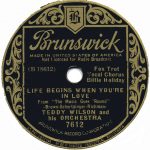
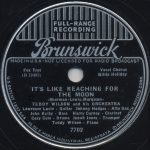
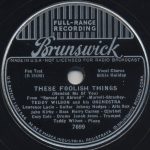
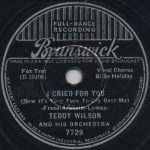
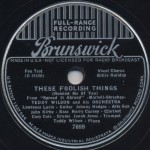
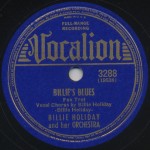
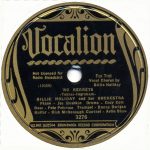
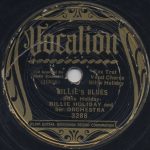
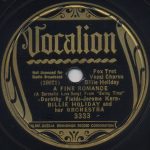
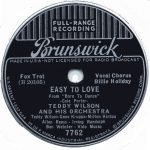
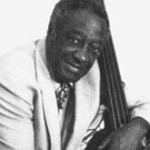
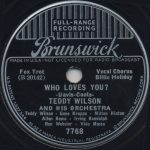
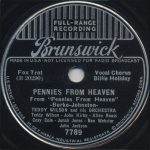
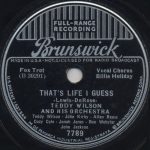
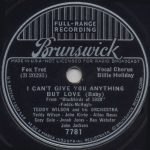
If ‘These Foolish Things’ really is one of your favourites, you ought to know that the lyrics were by Eric Maschwitz. Oh and if you’re interested he wrote it about Anna May Wong.
Hi, Don
look what Wikipedia says: “Albert Eric Maschwitz OBE (10 June 1901 – 27 October 1969), sometimes credited as Holt Marvell, was an English entertainer, writer, broadcaster and broadcasting executive”.
If you go to the lyrics menu in my site, letter “T”, you will see the complete credits. You didn´t know that?
By the way, it is one of my favorites, indeed.
Best, Paulo
Historic note, Billie’s version of “Summeritime ” from 1936 was the first version ever to be released, it’s estimated that is has been recorded some 33,000 times since.
I didn´t know that, Derrick. If you agree, I will post this comment in the site’s LYRICS section.
Thanks.
first i must say, the night i stumbled on this site was one of luckiest i’ve had in a while. Awesome! I grew up in the 50s and 60s during the incredible music explosion. By the 90s i was looking for new music thus going back in time and discovering the great music of the 30s and 40s. That’s when Billie entered my life. Since, i’ve been expanding my repertoire of her music. Recently i purchased the Complete B H on Columbia with intention of obtaining the complete Verve at some point. I discovered this site in running across the incredible California sessions in 1957. First time i heard them. I enjoyed your ratings of each piece. What i don’t understand is your ratings of some of the early sessions. Take 1938 for example. The scrumptious When a Woman Loves A Man gets one star. Same for the Moon Looks Down, and I Can’t Believe Your In Love With Me. 1936 the four songs with Berigan and Shaw are worth 3 stars just for the delightful interplay between the two. Two of my favorite musicians off the era. Anyways i would appreciate an explanation and thank you so much for this wonderful site.
Thank you, Jim for your compliments. What caught my attention is that we may be contemporary, as I also grew up in the 50s and 60s, an era where for the first time one could here on the radio music for youngers. And what an explosion! I still keep a wide selection of CDs from that period. Similarly, I started enjoying jazz much older, in the eighties, when I heard Dinah Washigton, Peggy Lee, Nina Simone and, of course, Billie. I started with with their the last LPs, that I could still buy in the stores, like Distingué Lovers, All or Nothing at All, and so on. And I was completely seduced. Jim, I am not a musician, nor an expert. Everything I did was simply as an amateur, just for the pleasure of it. Many people have the same reaction of yours, including some friends, with my personal evaluation of what they call “the golden era”, or Teddy Wilson era. When I argue about the sound, they say: “you have no emotion, sound… sound… c’mon!” But I promise you, I will be back to those records and experience them again. Be in touch. Paulo
Thanks for replying. Very funny. Don’t get me wrong, like you, i prefer the jazzy, groovy, swing structure of the later Billie like the 57 sessions even though her voice is not as clean as the younger days. I actually think the somewhat strained voice helps expressing emotion. To me, more important than the voice is the way she sings the song. Plus, one cannot deny the superior sound quality (it’s 20 years later).
That said, i still believe there were some true gems from the Teddy Wilson era. Do you notice how formulaic so many of the songs of that era are? Many songs consisted of a 1 minute instrumental, Billie singing for 1 minute, and a one minute instrumental outro. The infectious When Your Smiling is a great example. In a 2:52 minute song Billie sings for 35 seconds. Great outro by Wilson and Lester Young that last 1:25. Plus, many had a similar beat. Oh well, i guess the debate over which Billie is better, the younger or older, will continue.
What a great resource! I happened upon your site while filling in dates and personnel information on an iPod that I have dedicated to just the works of Bessie Smith and Billie Holiday. (I like to think that Billie would appreciate sharing space with the Empress of the Blues.) You present a cornucopia of information, and I enjoy the opinions and insights you offer on certain songs. The one that perhaps shocks me a bit is your dislike of Billie’s Summertime. It is one of my favorite of her early recordings. Although it lacks the best of her usual accompanists–Ben Webster, Lester Young, Roy Eldgridge, Teddy Wilson–Bunny Berigan, nonetheless, blows the hell out of the song, and with Artie Shaw and Billie, immerse the listener in the heat, humidity, and oppressiveness of a Southern summer day. Although the lyrics beg to be treated as a tender lullaby or spiritual, Billie–knowing that such sentiments as “your daddy’s rich and your ma is good-lookin'” and “there ain’t nothin’ can harm you” are a lie–approaches the song as a strident personal affront to anything that might stand in her way: “So hush, little baby, don’t you cry!” To me, she is steeling herself to take on the world. In some ways, it may be Billie’s first song that expresses her experience of being a black woman in America. Supposedly, Summertime is the most covered song in the world. It may be so, and there are certainly many great versions (including Artie Shaw’s own 1945 rendition with Roy Eldridge), but to my mind Billie’s, the first hit recording of the song, has never been beaten. Anyway…thanks for all your hard-work; it has been invaluable.
Dear John, sorry for the delay to get in touch. Many thanks for the compliments. Well, you are right. How can anyone dislike Summertime? Probably the first time I heard it was as a teenager, dancing Summertime by Ray Conniff. Remember that one? But your comment will be displayed in the site to counterbalance my opinion. Stay in touch, your comments will be always very welcome. Paulo